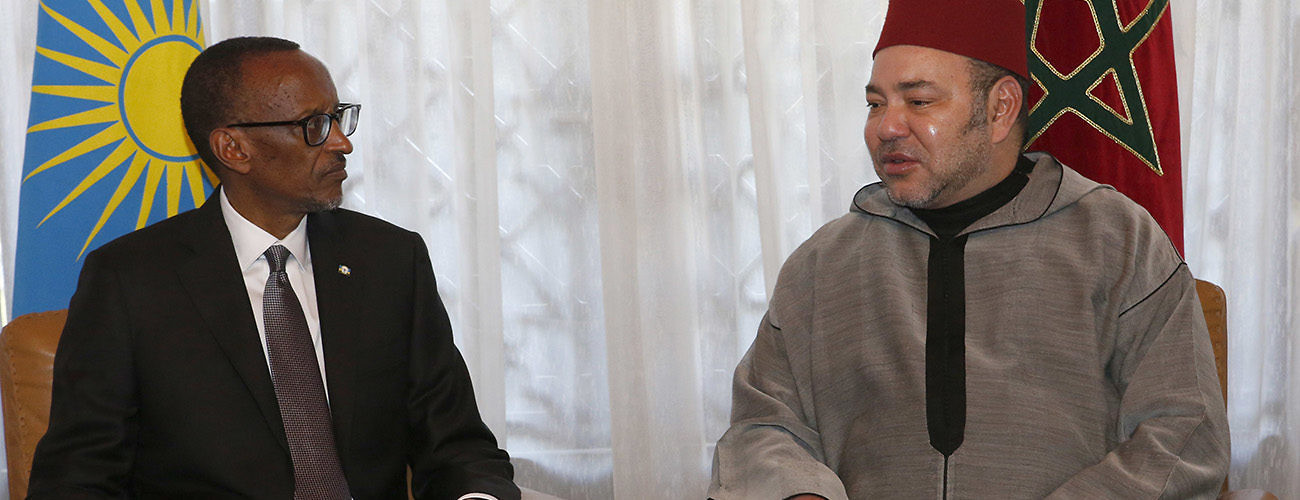Rwandan President Paul Kagame (left) meets with Morocco's King Mohammed VI before the former hosted the African Union Summit. Casablanca, Morocco, June 20, 2016. (Abdeljalil Bounhar/AP Photo)
Morocco’s King Mohammed VI formally requested for his country to join the African Union at the organization’s summit in Kigali, Rwanda, on July 17. In 1984, Mohammed VI’s father, Hassan II, withdrew from the AU’s predecessor, the Organisation of African Unity, in protest of its admission of the Sahrawi Arab Democratic Republic (Western Sahara), with which Morocco has a long-running territorial dispute. Although the AU request has been presented as a “surprise,” or as the result of a recent effort, it is better understood as the product of extended diplomatic outreach beginning several years ago.
Currently the only African country not a member of the AU, Morocco’s request to join builds on years of outreach to African, and especially West African, countries. This revolves around a strategy of royal visits by the king himself, as well as economic and cultural cooperation agreements between countries. In 2013, the king visited Mali, Senegal, Cote d’Ivoire, and Gabon. In 2014, he again visited Mali, Cote d’Ivoire, and Gabon, as well as Guinea. In 2015, Minister of Foreign Affairs Salaheddine Mezouar visited Côte d’Ivoire, Gabon, Guinea, and Senegal. In 2014, Morocco signed 24 agreements with Gabon in such diverse sectors as agriculture, health, training, technology, transportation, and tourism. In 2015, Cote d’Ivoire raised approximately $222 million in bonds, mostly financed by Moroccan banks. The Moroccan Ministry of Endowments and Islamic Affairs also contributed to the outreach, repairing Mosque Hassan II in Gabon.
Following the state visits, a number of countries acknowledged their continued support of Morocco’s plan to give autonomy, but not independence, to Western Sahara. Gabon publicly reiterated its support for Morocco’s plan in 2013, Senegal followed suit in 2015, and Niger did so this year.
Morocco has also courted AU members beyond West Africa. In 2014, Minister Delegate of Foreign Affairs Mbarka Bouadi hosted a number of meetings in Addis Ababa during the 22nd AU Summit, including with representatives of Tanzania, Angola, Kenya, Togo, Benin, Uganda, Rwanda, and Nigeria. The presence of Moroccan diplomats at the event foreshadowed the bid for membership.
Morocco subsequently launched a diplomatic blitz this year. It opened new embassies in Rwanda, Kenya, Tanzania, and Mozambique. The king also deployed a number of high-ranking officials across the continent to argue the Moroccan case. Zambia officially revoked its recognition of the Western Sahara nine days before the recent AU Summit, after a visit from Nacer Bourita, one of Morocco’s senior diplomats. Days later, Bourita visited Nigeria.
In the weeks leading up to the summit, Moroccan Minister of Foreign Affairs Salaheddine Mezouar visited Senegal, Côte d’Ivoire, Cameroon, Egypt, Ethiopia, Libya, Sudan, and Tunisia to build support for the initiative. Meanwhile, Special Envoy Taib Fassi Fihri visited Kenyan President Uhuru Kenyatta days before the event opening. This two-pronged approach of long-term diplomacy and last-minute diplomatic blitz appears to have been successful.
Morocco now receives public backing from some of West and Central Africa’s most influential heads of state. In a recent interview, Senegal President Macky Sall said “I rejoice!” when asked for his reaction to the king’s letter seeking admission to the AU. Current AU Chairman, Chadian President Idriss Déby, also supports Morocco’s request. In a statement, he said that Morocco, as an African country, had the right to return to the union “when and how it wants to.”
In order to do so, Morocco will need a majority of the 54 current members to vote in favor of its membership. It effectively needs the support of 28 member states. It appears that the request will be granted, though a vote is not expected until the next AU Summit, scheduled for January. While it hopes to join without conditions, Morocco has previously stated that it will not do so unless Western Sahara’s membership is revoked. For that to happen, support of a two-thirds majority, or 36 states, will be required.
In a show of support for Morocco, a day after the king submitted his request 28 countries signed a motion calling for the suspension of Western Sahara. The motion marked a dramatic reversal from the AU’s longtime support for demands for the principle of self-determination and for Western Sahara in particular. The Moroccan press reports that countries such as Tunisia, Niger, and Mali also supported the motion, though they were unwilling to sign the document for political reasons, such as sharing a border with Algeria, the main sponsor of the separatists. It now appears more likely than ever that Morocco will find the votes it needs.
Three major powers in the AU continue to support Western Sahara: Algeria, Nigeria, and South Africa. Although Morocco’s relations with Nigeria were tense under President Goodluck Jonathan, as I previously outlined in the Global Observatory, they have been improving since Muhammadu Buhari’s election in 2015. Convincing Nigeria to vote in favor not only of its membership, but also against the Western Sahara, will be a central plank of Morocco’s diplomacy in the coming months.
Looking ahead, it is worth watching the elections for the next AU Commission chairperson. The incumbent Nkosazana Dlamini-Zuma supports Algeria and South Africa’s efforts on behalf of Western Sahara. An attempt to elect a new chairperson failed at the recent summit and the election was postponed for six months, possibly extending Dlamini-Zuma’s term. Given that Senegalese diplomat Abdoulaye Bathily is reportedly considering a run in January, Morocco’s fortunes could change decisively. It now appears certain that Morocco can join the AU if it wishes, and it appears likely that it will do so on its own terms.
Ann Marie Wainscott is Assistant Professor in the Department of Political Science at St. Louis University.





